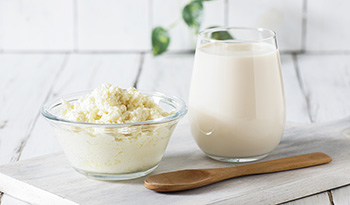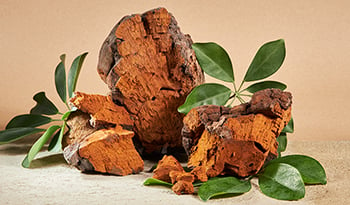Boron Supplement Benefits and Uses

You probably know you need your daily dose of Bs—vitamins like thiamin (B1), riboflavin (B2), niacin (B3), and cyanocobalamin (B12)—but did you know there’s another B that can support your body? It’s boron, an element that has numerous benefits and may be essential for human health.
Read on to discover how boron, a nutrient and supplement acclaimed for its health benefits, can aid in managing diabetes, high cholesterol, and vaginal yeast infections.
Boron Basics
Boron is a trace mineral found in many plant foods and can be taken as a dietary supplement. It’s a hard, metallic element—B and element number 5 on the periodic table—that you may have learned about in high school chemistry class. Some scientists think it may have been essential for the beginning and evolution of life.
While more research is needed to better understand exactly what boron does in the human body, growing evidence suggests it has a beneficial impact on reproduction and development, calcium metabolism, brain function, bone formation, insulin metabolism, immunity, and how steroid hormones function.
Unlike macro minerals like calcium, magnesium, and phosphorus, our bodies only need small amounts of boron and other trace minerals, such as selenium, iron, copper, and zinc, to be healthy. Boron and the other trace minerals act as catalysts in enzyme systems. They are essential for breaking down complex molecules into smaller units the body can use.
Although a tremendous amount of evidence supports boron’s benefits, the United States Institute of Medicine Food and Nutrition Board has not yet established an adequate intake for boron. As a result, no Recommended Dietary Allowance (RDA) for boron currently exists.
Based on animal and human studies, the World Health Organization (WHO) suggests 1 to 13 milligrams daily is a healthy, safe range. The tolerable upper limit for adults over age 19 is 20 milligrams per day, according to the Food and Nutrition Board.
Boron Supplement Benefits
What do boron supplements do? Studies suggest boron supplementation may have many benefits, including supporting bone health, balancing hormones, and treating arthritis.
Boron supplements are available alone and in vitamin and mineral formulas. As a supplement, boron comes in several forms, including sodium borate, boron amino acid chelate, boron citrate, and calcium boron.
Boron in the form of boric acid is also used vaginally to treat yeast infections. Topically, it helps treat wounds and injured skin.
Boron Uses
Boron has many beneficial effects on the body and impacts various biological and biochemical systems. Scientists are beginning to understand how it works and discover all its uses and benefits.
Research shows boron positively impacts bone health and the central nervous system, cardiovascular system, immune system, and endocrine system. It also may reduce inflammation and modulate oxidative stress.
Not consuming enough boron may be a health hazard. Boron deficiency is associated with a range of symptoms, including arthritis, bone loss, and decreased immunity.
Heart Health
Evidence is mounting that boron can support your heart and entire cardiovascular system. It appears to significantly reduce total cholesterol, LDL “bad” cholesterol, and triglycerides. Plus, boron seems to modulate inflammation, a major factor in the development of atherosclerosis and cardiovascular disease.
A randomized controlled trial of patients with stable angina (chest pain that is a symptom of heart disease) found that a combination of resveratrol and calcium fluoroborate improved quality of life and cholesterol levels. Animal studies have found that boron significantly lowers triglycerides and LDL, “bad” cholesterol, and increases HDL, “good” cholesterol.
A review of boron’s effects on cardiovascular disease risk factors found that boron-containing compounds may offer cardioprotective effects that may be useful as supplements or in medicines.
Diabetes
Diabetes affects 537 million adults. The disease occurs when the body either doesn’t make enough insulin (the hormone that moves glucose from the bloodstream into the cells) or can’t use it properly. As a result, blood sugar levels can rise to unhealthy levels.
Research shows that boron along with spices like cinnamon and garlic, green tea, and the supplement chromium may help manage blood sugar levels.
One study found that blood levels of boron were much higher in people without diabetes than those with the disease. The researchers concluded that boron supplementation may help treat diabetes and obesity.
An animal study found that boron-deprived rats had significantly higher insulin levels than animals receiving boron supplementation. Another animal study found that rats fed boron for 28 days experienced a decrease in insulin, body weight, and leptin, a hormone that increases satiety.
In addition, a test-tube study found that boron enhanced the survival and maintenance of pancreatic beta cells, the cells that make, store, and release insulin.
Feminine Care and Health
Vaginal yeast and bacterial infections are common health issues for women. They can start as early as adolescence and impact an estimated 75% of women at some point in their lives. They occur when there is an imbalance of healthy and unhealthy bacteria.
Using a boron acid suppository, along with improving your overall gut health by consuming probiotics and prebiotics, can help treat a yeast infection.
Boric acid appears to have both antibacterial and antifungal properties. Test tube studies have shown that boron inhibits the growth of candida, the type of yeast that causes infections.
A clinical review examining the use of boric acid for recurrent vaginal candidiasis concluded that boric acid is a safe, affordable treatment alternative for women with recurrent and chronic symptoms of vaginitis.
Before using boric acid suppositories to treat a vaginal infection, consult your healthcare provider to get a diagnosis and understand all your treatment options.
Bone Health
Boron plays an important part in bone metabolism and development and supports overall bone health. Scientists believe boron may affect bone by impacting blood levels of vitamin D, estrogen, and testosterone. It may also impact how the body uses bone minerals like calcium and magnesium.
Studies suggest boron supplementation can increase both the density and strength of bone. This is a big benefit for postmenopausal women, who are at a higher risk of osteoporosis due to lower estrogen levels. An estimated 30% of Caucasian postmenopausal women in the United States have osteoporosis.
Scientists have known for decades that boron is important for bone health. A 1985 study on postmenopausal women fed a low-boron diet and then given a boron supplement showed that boron supplementation reduced calcium excretion in the urine by 44%. A more recent study showed that the calcium fructoborate, a naturally occurring boron-based nutritional supplement, boosted bone density in 66 out of 100 patients with osteoporosis.
Animal studies have also shown that boron deficiency has a negative effect on bone development, growth, thickness, and strength and causes abnormal limb development. Conversely, other animal studies have shown that boron supplementation stimulates bone formation and improves bone strength.
Joint Function and Cartilage Health
An estimated 25% of American adults have been diagnosed with arthritis. Boron supplementation may be a safe, effective way to reduce pain, improve physical ability, and help prevent osteoarthritis.
Like other joint-supporting supplements, such as glucosamine, chondroitin, turmeric, and Boswellia, boron may help reduce inflammation in the body. Reducing inflammation can support joint health and reoccurring pain felt in patients with rheumatoid arthritis or osteoarthritis.
Research on healthy men published in the Journal of Trace Elements in Medicine and Biology found that supplementation with 6 milligrams of boron daily resulted in a decrease in three inflammation biomarkers: interleukin, C-reactive protein, and tumor necrosis factor.
Population studies have shown that in parts of the world where boron intake is low (1 milligram per day or less), the incidence of arthritis is estimated to be 20 to 70%. In places where boron intake is high (3 to 10 milligrams daily), the rate of arthritis ranges from 0 to 10%.
A well-designed study of healthy subjects found that supplementing with calcium fructoborate for two weeks reduced C-reactive protein by 37%. Another randomized controlled study of middle-aged people with osteoarthritis found that two weeks of boron supplementation reduced C-reactive protein by over 60%.
Hormone Balance
Research shows that boron affects the function and abundance of many hormones, including estrogen, progesterone, testosterone, thyroid hormone, vitamin D, and insulin.
Boron has been shown to increase sex hormone levels in both women and men. One study of postmenopausal women found that women fed a low-boron diet followed by a boron-rich diet significantly increased their blood levels of estradiol (an estrogen steroid hormone) and testosterone. The results were almost double that of women with diets low in magnesium.
Another study found that healthy men who consumed a 6-milligram boron supplement had a significant increase in free testosterone and a decrease in estradiol in only one week.
Brain Function
Boron supplementation may also benefit the central nervous system and how the brain works. While more studies are needed, research suggests that boron may improve cognitive performance, memory, and attention span.
Research on animals and people has shown that boron deprivation causes decreased electrical brain activity in a way that resembles what’s observed with general malnutrition. Other studies have shown that boron deprivation negatively affects attention, short-term memory, and tasks requiring motor speed and dexterity.
Wound Healing
Boron may help support the body’s natural ability to heal. It plays a role in the metabolism of calcium, magnesium, and vitamin D, all of which are required for wound healing and tissue repair.
Topical solutions containing 3% boric acid have been shown to reduce the time it takes for deep wounds to heal. A well-designed clinical trial of women undergoing radiation therapy for breast cancer found that a boron-based gel significantly reduced radiation dermatitis, a skin condition that affects 90% of women undergoing radiation to treat breast cancer.
Boron Supplement Side Effects
Boron is not likely to have negative side effects when taken in doses below the safe upper limit of 20 milligrams daily for adults from both food and supplements.
According to the National Institute of Health, boron doesn’t appear to interfere or interact with other supplements or medications. If you have questions about using boron, talk with your doctor or registered dietitian.
When consumed in safe amounts (under 20 milligrams daily), excess boron is excreted in the urine. However, consuming large doses may be harmful and might cause fertility problems in men. Large doses can be poisonous and cause symptoms including:
- Nausea
- Vomiting
- Weakness
- Diarrhea
- Headaches
- Vomiting
- Convulsions
Natural Sources of Boron
Boron is found in plant foods like fruits (especially raisins, currants, and prunes), vegetables, beans and lentils (especially red kidney beans), and nuts (especially hazelnuts, almonds, and peanuts). Wine, cider, and beer are also good sources of boron. Most grains and animal-based foods, like fish, meat, and dairy products, are low in boron.
The typical diet provides 0.75 to 1.35 milligrams of boron daily. However, diets rich in meats and processed grains often contain less than 0.75 milligrams of boron. Many people don’t get the suggested intake of more than 1 milligram a day and would benefit from a boron supplement and/or a diet rich in boron-containing foods.
Boron tends to accumulate in bone, hair, and nails, but not in other body tissues. It is easily absorbed from supplements and food. The body absorbs 85 to 90% of boron consumed and excretes what isn’t needed to maintain the right balance of boron in the body.
Should I Take a Boron Supplement?
People who consume less than 1 milligram of boron daily will likely benefit from supplementation or increasing boron intake in their diets. Depletion-repletion experiments, where test subjects eat a low-boron diet and then receive a boron supplement, have shown that people respond well to supplementation.
While scientists have not established whether low boron intakes are harmful, the evidence is becoming clear that boron is necessary for optimal health and can be used to help treat or prevent a variety of diseases.
Possible issues associated with boron deficiency include osteoporosis, arthritis, nervous system dysfunction, hyperthyroidism, and sex hormone imbalance. Studies on animals have shown that boron is essential for the life cycle and that deficiency prevents procreation.
If your diet is low in boron-containing foods like fruits, nuts, and legumes, consider supplementing to get at least 1 milligram of boron daily. Consult your medical provider to learn if boron supplements are right for you.
References:
- Aydın S, Demirci S, Doğan A, Sağraç D, Kaşıkcı E, Şahin F. Boron containing compounds promote the survival and the maintenance of pancreatic β-cells. Mol Biol Rep. 2019 Oct;46(5):5465-5478.
- Demirdogen RE (2020) Relationship Among Blood Boron Level, Diabetes Mellitus, Lipid Metabolism, Bone Metabolism and Obesity: Can Boron Be An Efficient Indicator for Metabolic Dissesases? Health Sci J 14:1.
- Iavazzo C, Gkegkes ID, Zarkada IM, Falagas ME. Boric acid for recurrent vulvovaginal candidiasis: the clinical evidence. J Womens Health (Larchmt). 2011 Aug;20(8):1245-55.
- Kucukkurt I, Akbel E, Karabag F, Ince S. The effects of dietary boron compounds in supplemented diet on hormonal activity and some biochemical parameters in rats. Toxicol Ind Health. 2015 Mar;31(3):255-60.
- Liu Q, Liu Z, Zhang C, Xu Y, Li X, Gao H. Effects of 3% Boric Acid Solution on Cutaneous Candida albicans Infection and Microecological Flora Mice. Front Microbiol. 2021 Sep 7;12:709880.
- Nielsen FH. Is boron nutritionally relevant? Nutr Rev. 2008;66(4):183-191
- Mahabir S, Spitz MR, Barrera SL, Dong YQ, Eastham C, Forman MR. Dietary boron and hormone replacement therapy as risk factors for lung cancer in women. Am J Epidemiol. 2008 May 1;167(9):1070-80.
- Orak F, Nazik H, Yalcinkaya KT, Gundes A, Doganer A, Nazik S, Mulayim MK, Ozturk P. Antifungal efficacy of pure boron on yeast and mold isolates causing superficial mycosis. J Pak Med Assoc. 2022 Jul;72(7):1330-1334.
- Penland JG. The importance of boron nutrition for brain and psychological function. Biol Trace Elem Res. 1998;66:299–317
- Pizzorno L. Nothing Boring About Boron. Integr Med (Encinitas). 2015 Aug;14(4):35-48.
- Rondanelli M, Faliva MA, Peroni G, Infantino V, Gasparri C, Iannello G, Perna S, Riva A, Petrangolini G, Tartara A. Pivotal role of boron supplementation on bone health: A narrative review. J Trace Elem Med Biol. 2020 Dec;62:126577.
- Scorei RI, Rotaru P. Calcium fructoborate--potential anti-inflammatory agent. Biol Trace Elem Res. 2011;143(3):1223-1238.
- Sheng MH, Taper LJ, Veit H, Thomas EA, Ritchey SJ, Lau KH. Dietary boron supplementation enhances the effects of estrogen on bone mineral balance in ovariectomized rats. Biol Trace Elem Res. 2001 Jul;81(1):29-45.
DISCLAIMER:This Wellness Hub does not intend to provide diagnosis...
















































































 Table of Contents
Table of Contents















